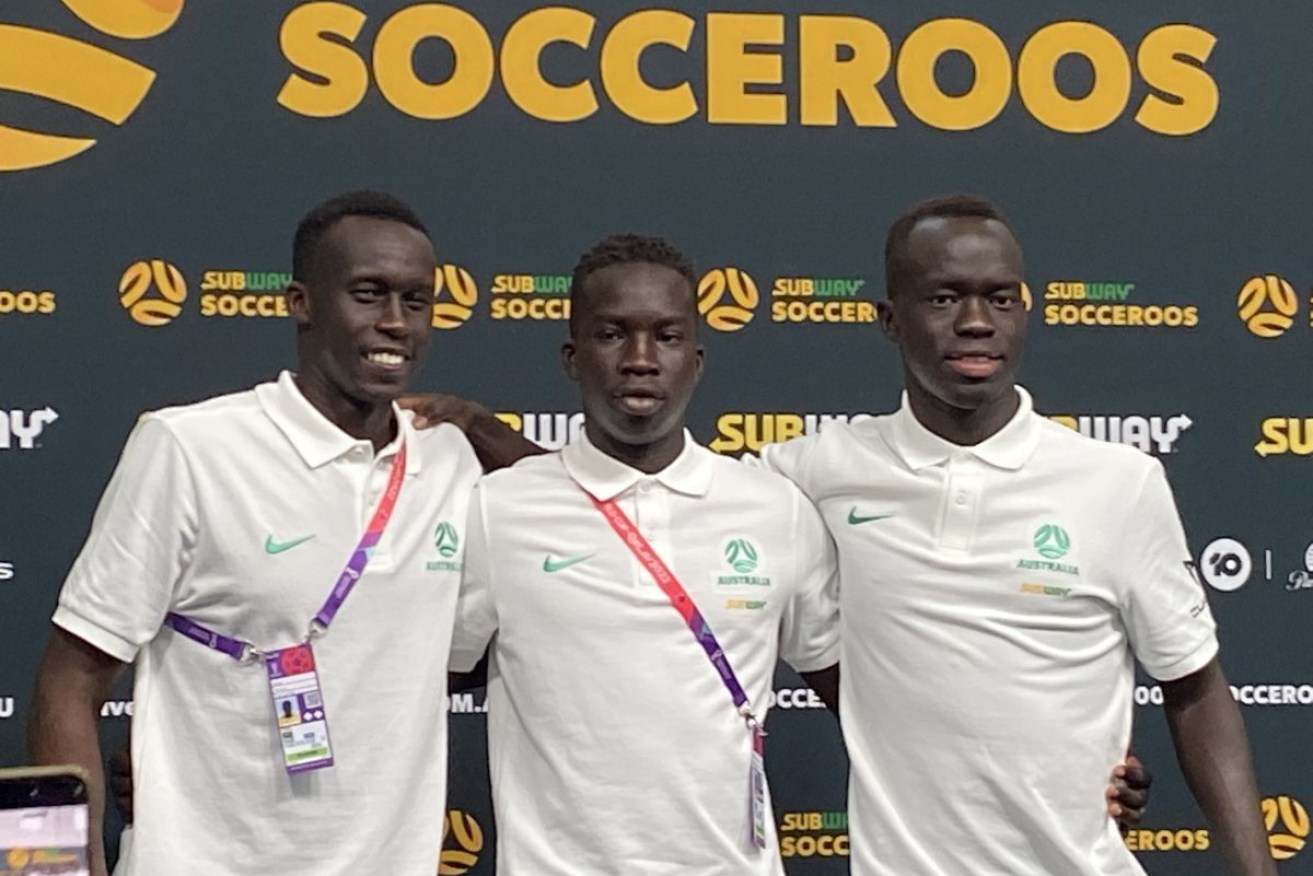Numbers game for Socceroos’ World Cup campaign
As Australia prepares for its first World Cup clash against France, Spiro Karanikos-Mimis measures team selection and explains why the result is not as simple as just winning or losing.

Socceroos Thomas Deng, Garang Kuol and Awer Mabil in Qatar on Friday. Photo: AAP/Steve Larkin
We are under a day away from Australia’s first game at the 2022 World Cup, and I’d be lying if I said I wasn’t a nervous wreck.
Despite the controversies, the debate about the players selected or Graham Arnolds tactics the reality is this: at my core I just want to see my Socceroos win (or more specifically, get out of their group).
Make no mistake, this group offers Australia the best chance of getting to the knock-out rounds since South Africa in 2010.
This is not an easy group and as we saw in 2010, if you start the competition poorly, it is very hard to recover. Despite a draw against Ghana and a win against Serbia, the four-nil loss to Germany in the first game of that tournament cost Australia the chance of getting through the group.
That’s why tomorrow’s game against France is so vital.
The obvious preference is for us to get at least a point from this game. A win would be amazing and a remarkable feat. But speaking truthfully, even a loss tomorrow could be a win of sorts. We can’t afford to lose by more than two goals. Four points may be enough to qualify if Australia’s goal-difference is respectable.
Despite head-to-head results usurping goal-difference as the primary separator between teams in many competitions world-wide, the World Cup still uses goal-difference if teams end up on the same points.
This must be something playing in Arnold’s mind, with news that he is seriously contemplating a tactical change for tomorrow’s game. If the rumour is to be believed, he will deploy a back three. This will see Australia’s spine consist of three defenders, three midfielders and two forwards with two wingbacks offering width.
The aim is to compress as much space in the middle, stay compact and hit the French on the counter by potentially exploiting an overload on the weak side of play.
There’s nothing genius behind the tactical shift: it’s rudimentary football. But Arnold has shown himself as a shrewd operator when it comes to facing teams where pragmatism is required (Argentina at the Olympics for example).
Expect us to lose the possession game. Expect us to leave a leg or two in tackles. Expect us to try and strangle the French. Just don’t expect us to play “the right way”.
Even though the Australians will say publicly they want to win, they will know a draw or a loss by a small margin gives them a real chance of finishing in the top two spots.And that leads to the predicament of who plays tomorrow.
Mat Ryan will start in goals. Kye Rowles and Harry Souttar will take two of three central-defensive positions. It’s a risk considering their injury issues, but Souttar’s height will be a bonus at set-pieces and Rowles is deceptively fast.
That leaves either Milos Degenek, Thomas Deng (who’s South Australian by the way) or Baily Wright to occupy the third spot.
I think Wright will get the nod, purely because he is the no-nonsense centre-back that’s required. At right wing-back I would have played Martin Boyle, but he’s out of the tournament after being unable to shake off a knock.
So it falls to either Fran Karacic or Nathaniel Atkinson. I’m starting Atkinson by dint of his appearances at right-back and right-midfield for Hearts, making him a more natural choice.
Left wing-back? If I was the coach, it would be Goodwin. As we know, he’s adept at going forward and has played at left-back enough to know the role. Also, his delivery on dead balls may be one way Australia can score.
Realistically, it will be Aziz Behich, who remains our best left-back and is more suited to the defensive game required.
In the centre of the park, Aaron Mooy and Jackson Irvine should start. Ajdin Hrustic, arguably out best midfielder, will only make the bench after recovering from his injury. That leaves Keanu Baccus, Cam Devlin or Riley McGree as the three remaining (natural) options.
Who starts will depend on whether Arnold wants to play with a defensive midfielder or an attacking midfielder. If it’s the former it will probably be Devlin who slots into the six, with Mooy and Irvine playing as a flat midfield duo. If it’s the latter, Riley McGree will start alongside Irvine with Mooy pushing into the 10.
And finally, the two strikers. Jamie Maclaren is in, but I wouldn’t expect Jason Cummings to play alongside him.
Arnold has a very soft spot for two players we have yet to mention – Mitchell Duke and Matthew Leckie. Leckie can also retreat into midfield should adjustments be needed or if Australia score and decide they are going to sit back. It’s for that reason I reckon Leckie will accompany Maclaren in the forward line (plus, the obvious familiarity of being teammates at Melbourne City).
The French are laden with talent, even with so many regulars out of the tournament. It is one of the hardest tests in international football, but should Australia not concede early and frustrate the French, the dominos may just fall our way.




